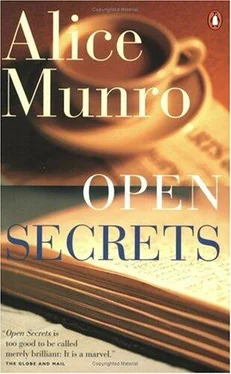She sold the shop — she sold it to Donalda, who had wanted to buy it for a long time. She took the money, and she got herself onto a flight to Australia and did not tell anyone where she was going. She lied, talking about a long holiday that would start off in England. Then somewhere in Greece for the winter, then who knows?
The night before she left, she did a transformation on herself. She cut off her heavy reddish-gray hair and put a dark-brown rinse on what was left of it. The color that resulted was strange — a deep maroon, obviously artificial but rather too sombre for any attempt at glamour. She picked out from her shop — even though the contents no longer belonged to her — a dress of a kind she would never usually wear, a jacket-dress of dark-blue linen-look polyester with lightning stripes of red and yellow. She is tall, and broad in the hips, and she usually wears things that are loose and graceful. This outfit gives her chunky shoulders, and cuts her legs at an unflattering spot above the knees. What sort of woman did she think she was making herself into? The sort that a woman like Phyllis would play bridge with? If so, she has got it wrong. She has come out looking like somebody who has spent most of her life in uniform, at some worthy, poorly paid job (perhaps in a hospital cafeteria?), and now has spent too much money for a dashing dress that will turn out to be inappropriate and uncomfortable, on the holiday of her life.
That doesn’t matter. It is a disguise.
In the airport washroom, on a new continent, she sees that the dark hair coloring, insufficiently rinsed out the night before, has mixed with her sweat and is trickling down her neck.
Gail has landed in Brisbane, still not used to what time of day it is and persecuted by so hot a sun. She is still wearing her horrid dress, but she has washed her hair so that the color no longer runs.
She has taken a taxi. Tired as she is, she cannot settle, cannot rest until she has seen where they live. She has already bought a map and found Eyre Road. A short, curving street. She asks to be let out at the corner, where there is a little grocery store. This is the place where they buy their milk, most likely, or other things that they may have run out of. Detergent, aspirin, tampons.
The fact that Gail never met Sandy was of course an ominous thing. It must have meant that Will knew something very quickly. Later attempts to ferret out a description did not yield much. Tall rather than short. Thin rather than fat. Fair rather than dark. Gail had a mental picture of one of those long-legged, short-haired, energetic, and boyishly attractive girls. Women . But she wouldn’t know Sandy if she ran into her.
Would anybody know Gail? With her dark glasses and her unlikely hair, she feels so altered as to be invisible. It’s also the fact of being in a strange country that has transformed her. She’s not tuned into it yet. Once she gets tuned in, she may not be able to do the bold things she can do now. She has to walk this street, look at the house, right away, or she may not be able to do it at all.
The road that the taxi climbed was steep, up from the brown river. Eyre Road runs along a ridge. There is no sidewalk, just a dusty path. No one walking, no cars passing, no shade. Fences of boards or a kind of basket-weaving — wattles? — or in some cases high hedges covered with flowers. No, the flowers are really leaves of a purplish-pink or crimson color. Trees unfamiliar to Gail are showing over the fences. They have tough-looking dusty foliage, scaly or stringy bark, a shabby ornamental air. An indifference or vague ill will about them, which she associated with the tropics. Walking on the path ahead of her are a pair of guinea hens, stately and preposterous.
The house where Will and Sandy live is hidden by a board fence, painted a pale green. Gail’s heart shrinks — her heart is in a cruel clutch, to see that fence, that green.
The road is a dead end so she has to turn around. She walks past the house again. In the fence there are gates to let a car in and out. There is also a mail slot. She noticed one of these before in a fence in front of another house, and the reason she noticed it was that there was a magazine sticking out. So the mailbox is not very deep, and a hand, slipping in, might be able to find an envelope resting on its end. If the mail has not been taken out yet by a person in the house. And Gail does slip a hand in. She can’t stop herself. She finds a letter there, just as she had thought it might be. She puts it into her purse.
She calls a taxi from the shop at the corner of the street. “What part of the States are you from?” the man in the shop asks her.
“Texas,” she says. She has an idea that they would like you to be from Texas, and indeed the man lifts his eyebrows, whistles.
“I thought so,” he says.
It is Will’s own writing on the envelope. Not a letter to Will, then, but a letter from him. A letter he had sent to Ms. Catherine Thornaby, 491 Hawtre Street. Also in Brisbane. Another hand has scrawled across it “Return to Sender, Died Sept. 13.” For a moment, in her disordered state of mind, Gail thinks that this means that Will has died.
She has got to calm down, collect herself, stay out of the sun for a bit.
Nevertheless, as soon as she has read the letter in her hotel room, and has tidied herself up, she takes another taxi, this time to Hawtre Street, and finds, as she expected, a sign in the window: “Flat to Let.”
But what is in the letter that Will has written Ms. Catherine Thornaby, on Hawtre Street?
Dear Ms. Thornaby ,
You do not know me, but I hope that once I have explained myself, we may meet and talk. I believe that I may be a Canadian cousin of yours, my grandfather having come to Canada from Northumberland sometime in the 1870s about the same time as a brother of his went to Australia. My grandfather’s name was William, like my own, his brother’s name was Thomas. Of course I have no proof that you are descended from this Thomas. I simply looked in the Brisbane phone book and was delighted to find there a Thornaby spelled in the same way. I used to think this family-tracing business was the silliest, most boring thing imaginable but now that I find myself doing it, I discover there is a strange excitement about it. Perhaps it is my age — I am 56—that urges me to find connections. And I have more time on my hands than I am used to. My wife is working with a theatre here which keeps her busy till all hours. She is a very bright and energetic young woman. (She scolds me if I refer to any female over 18 as a girl and she is all of 28!) I taught drama in a Canadian high school but I have not yet found any work in Australia .
Wife. He is trying to be respectable in the eyes of the possible cousin.
Dear Mr. Thornaby ,
The name we share may be a more common one than you suppose, though I am at present its only representative in the Brisbane phone book. You may not know that the name comes from Thorn Abbey, the ruins of which are still to be seen in Northumberland. The spelling varies — Thornaby, Thornby, Thornabbey, Thornabby. In the Middle Ages the name of the Lord of the Manor would be taken as a surname by all the people working on the estate, including laborers, blacksmiths, carpenters, etc. As a result there are many people scattered around the world bearing a name that in the strict sense they have no right to. Only those who can trace their descent from the family in the twelfth century are the true, armigerous Thornabys. That is, they have the right to display the family coat of arms. I am one of these Thornabys and since you do not mention anything about the coat of arms and do not trace your ancestry back beyond this William I assume that you are not. My grandfather’s name was Jonathan .
Читать дальше












